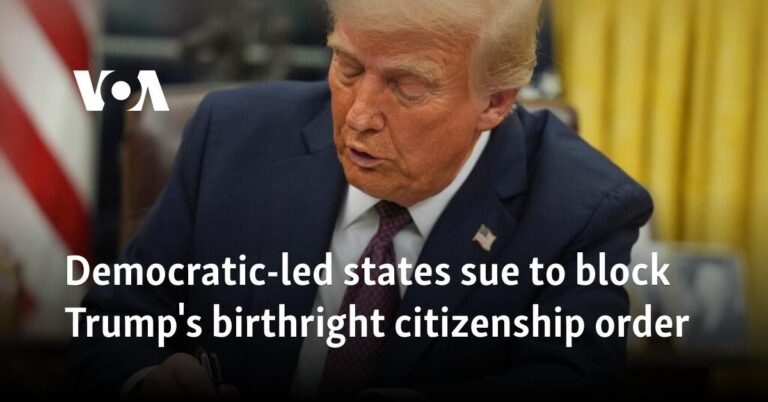A coalition of Democratic-led states has filed a lawsuit against the Trump administration, challenging recent restrictions on federal funding designated for victims of crimes. The states argue that the new policies unfairly limit access to critical resources and protective services, undermining efforts to support survivors. This legal action highlights ongoing tensions between state governments and the federal administration over funding priorities and victims’ rights.
Democratic-Led States Challenge Trump Administration on Victim Support Funding Cuts
Several Democratic-led states have officially challenged the Trump administration’s recent policy changes that impose stricter eligibility criteria and reduce funding for programs supporting victims of crimes. The states argue that these new restrictions undermine critical services, including counseling, legal assistance, and emergency housing, which are essential for survivors’ recovery and safety. By initiating this legal action, the states seek to reverse the cutbacks and preserve funding levels that have historically helped thousands of crime victims rebuild their lives.
Key points raised by the states in their lawsuit include:
- Reduced access to vital support services due to tightened federal requirements
- Disproportionate impact on vulnerable populations, including women, children, and minority groups
- Concerns over the long-term social and economic costs of depriving victims of adequate resources
| State | Victims Served (2023) | Funding Reduction % |
|---|---|---|
| California | 45,000 | 18% |
| New York | 32,500 | 22% |
| Illinois | 15,000 | 20% |
Legal Arguments Focus on Impact to Crime Victims and State Resources
Legal challenges brought by Democratic-led states emphasize the detrimental effects that the funding restrictions could have on crime victims’ access to essential services. Advocates argue that withholding federal resources undermines the support systems critical for victims’ recovery and safety, including counseling, legal aid, and emergency shelter provisions. These states assert that the policy not only jeopardizes victims but also erodes the trust between communities and law enforcement agencies trying to provide justice and protection.
Additionally, the lawsuits highlight concerns over the broader fiscal impact on state budgets. By limiting federal assistance, states may be forced to allocate more of their own resources to maintain victim support programs. The financial strain could lead to cutbacks in other vital areas, burdening state services already stretched thin. Below is a summary of the projected fiscal implications based on current estimates:
| State | Estimated Loss in Federal Funding | Potential State Budget Increase | Services at Risk |
|---|---|---|---|
| California | $50M | $30M | Counseling, Legal Aid |
| New York | $35M | $20M | Emergency Shelter, Advocacy |
| Illinois | $20M | $15M | Helpline, Victim Outreach |
Key arguments presented by the states include:
- Federal funding restrictions contravene established victims’ rights laws.
- Reduced funding compromises public safety by limiting comprehensive victim assistance.
- The administrative policy shifts unforeseen financial burdens onto state governments.
Analysis of Federal Restrictions and Their Broader Implications for Victim Assistance Programs
The federal restrictions introduced by the Trump administration have imposed stringent criteria on the allocation of funds to victim assistance programs, significantly impacting their operational scope. These regulations require grantees to certify compliance with policies that many advocates argue hinder services to vulnerable populations, particularly immigrant victims of crimes. Critics contend that such conditions limit access to essential resources, creating barriers that could deter victims from seeking support. The constraints also raise concerns about the erosion of trust between community organizations and the populations they serve, potentially undermining long-term efforts to combat crime and provide comprehensive aid.
Key challenges identified include:
- Mandated cooperation with immigration enforcement agencies, even when victims fear deportation.
- Restrictions that prioritize certain categories of crimes, marginalizing victims of others.
- Reduced flexibility in fund usage, limiting holistic victim care programs.
These limitations not only affect immediate victim support but have broader implications for public safety and social justice initiatives. Evidence suggests that victim assistance programs play a critical role in encouraging cooperation with law enforcement and fostering community resilience. Below is a summary table highlighting the potential impact of these federal restrictions on victim support outcomes:
| Impact Area | Effect of Restrictions | Long-Term Implications |
|---|---|---|
| Victim Accessibility | Decreased due to fear of deportation | Lower reporting rates, under-addressed crime |
| Program Flexibility | Restricted usage for certain victim needs | Narrowed scope of services provided |
| Community Trust | Eroded by increased enforcement requirements | Diminished collaboration, weaker safety nets |
Recommendations for Policy Reforms to Ensure Adequate Funding and Support
Policymakers must prioritize ensuring that financial support for victims of crime remains uninterrupted and sufficient. To accomplish this, lawmakers should consider enacting legislation that guarantees a protected funding stream, exempt from administrative restrictions and shifts in political agendas. This includes establishing clear, federally mandated allocation formulas that distribute funds equitably among states, with a particular focus on vulnerable populations often overlooked in the existing framework. Additionally, transparency measures should be embedded into the funding process to facilitate public accountability and enable timely detection of any deviations or cuts.
Practical reforms could include the implementation of:
- Flexible grant mechanisms that allow states to tailor resources to their unique victim support needs while adhering to basic oversight.
- Mandatory periodic reviews to assess the sufficiency and impact of allocated funds, preventing stagnation and ensuring dynamic responsiveness.
- Increased federal oversight to monitor administrative enforcement and prevent politically motivated restrictions.
| Policy Reform | Impact |
|---|---|
| Protected Funding Stream | Stable and reliable support regardless of political changes |
| Grant Flexibility | Customization for diverse state needs |
| Transparency & Accountability | Public oversight and prevention of misuse |
| Mandatory Reviews | Continuous improvement of funding effectiveness |
In Retrospect
As the legal battle unfolds, Democratic-led states continue to challenge the Trump administration’s restrictions, framing the issue as a critical fight over victims’ rights and federal authority. The case underscores ongoing tensions between state governments and federal policies, with implications that could reshape funding priorities for crime victims nationwide. Observers will be closely watching the courts’ next moves as both sides prepare for what promises to be a significant showdown in the years ahead.




